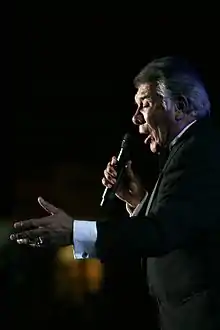Argentina in the OTI Festival
Argentina was one of the founding members of the OTI Festival and debuted in the event in 1972 when the first contest was held in Madrid. Canal 7 and Canal 13 Argentina were the two OTI member broadcasters that organised the Argentine participation in the event. Since their debut, this country participated regularly in the festival till 2000, when the last edition took place. All the Argentine representatives in the show were selected internally.
| Argentina | |
|---|---|
 | |
| Member station | Canal 13 Argentina / Canal 7 |
| National selection events | Internal selection |
| Participation summary | |
| Appearances | 27 |
| First appearance | 1972 |
| Best result | 1º 1979 1º 1988 1º 1991 1º 1994 |
| Worst result | 16th in 1978 |
| External links | |
| Canal 13 website Canal 7 website | |
History
Argentina was one of the most iconic and successful countries in the history of the OTI Festival. The two broadcasters managed to win the contest on four occasions. The first win came in 1979 in Caracas by Daniel Riolobos and his song "Cuenta conmigo" (Count on me) which turned into a hit. Some years later, in 1988 Argentina won the festival for second time with Guillermo Guido and his song "Todavía eres mi mujer" (You're still my wife). In 1991, in Acapulco (México) the South American country won for a third time with Claudia Brant and her song "Adonde estás ahora?" (Where are you now?). Three years later, in the Spanish city of Valencia, the country won for fourth and last time with Claudia Clarenzio and her elegantly performed song "Canción despareja" (Unlinked song).
Apart from their victories, Argentina achieved second place on another four occasions in 1981, with Marianella and her song "Súbete a mi nube" (Ride in my cloud), in 1985, with Marcelo Alejandro and his song "Y tu, prohibida" (And you... Forbidden)", in 1996, with the return of Guillermo Guido and his song "Cuanto te amo" (How much I love you) and in 1998, with Alicia Vignola with her song "Sin amor" (Without love).
Argentina also achieved two third places in 1980 with Luis Ordoñez and 1986 with Hugo Marcel.
Contestants

Guillermo Guido's four appearances are of note, as he returned to the event in 1996 and 2000 after his victory in 1988.
| Year | Artist | Song | Place | Pts |
|---|---|---|---|---|
| 2000 | Guillermo Guido | Amar es tan simple (to love is so simple) | SF | |
| 1998 | Alicia Vignola | Sin amor (Without love) | 2 | |
| 1997 | Raúl Lavié | Sin tu mitad (Without your half side) | SF | |
| 1996 | Guillermo Guido | Cuanto te amo (How much I love you) | 2 | |
| 1995 | Inés Rinaldi y Fernando Porta | Si se pierden las canciones (If the songs get lost) | ||
| 1994 | Claudia Carenzio | Canción despareja (Unlinked song) | 1 | |
| 1993 | Marcelo San Juan | Yo soy el otro (I'm the other one) | ||
| 1992 | Horacio Molina | Lo vivido (What has been lived) | ||
| 1991 | Claudia Brant | Adonde estás ahora? (Where are you now?) | 1 | |
| 1990 | Trío San Javier | Quedate chiquilin (Stay little boy) | ||
| 1989 | Mónica Cruz | Te quedarás en mi (You will stay inside me) | ||
| 1988 | Guillermo Guido | Todavía eres mi mujer (You are still my wife) | 1 | 26 |
| 1987 | Lalo Márquez y Daniel Altamirano | Todavía la vida (Life still) | 15 | |
| 1986 | Hugo Marcel | A ti no te ha dicho (He hasn't told it to you) | 3 | |
| 1985 | Marcelo Alejandro | Y tu, Prohibida (And You, Forbidden) | 2 | |
| 1984 | Alan y Roy | La luz de mi escritorio no se enciende
(The light of my desk does not turn on) |
||
| 1983 | Silvina Garré | Charlaciones (Monologues) | 16 | |
| 1982 | Magdalena León | Para dar las gracias (To say thank you) | 4 | 22 |
| 1981 | Marianella | Subete a mi nube (Ride in my cloud) | 2 | 40 |
| 1980 | Luis Ordóñez | Dime adiós (Say goodbye) | 3 | 31 |
| 1979 | Daniel Riolobos | Cuenta conmigo (Count on me) | 1 | 43 |
| 1978 | Carlos Bazán | Dijeron que era un niño (They said he was a kid) | 11 | 7 |
| 1977 | Jerónimo | Jugar a Vivir (To play to live) | 6 | 3 |
| 1976 | Adriana Santamaría | Como olvidar que te quise tanto
(How to forget that I loved you so much) |
8 | 3 |
| 1975 | Marti Cosens | Dos habitantes (Two inhabitants) | 11 | 3 |
| 1973 | Juan Eduardo | Dije que te quiero (I said that I love you) | 9 | 3 |
| 1972 | Víctor Heredia | Sabes que estamos aquí, América
(You know that we are here, América) |
9 | 3 |
